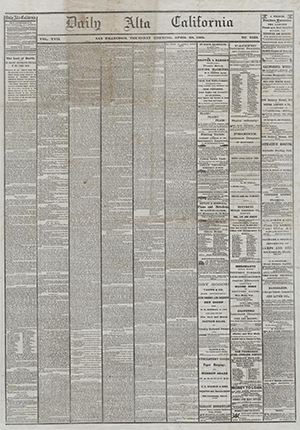Historic Document
Petition to California Governor John Bigler (1852 )
Norman Asing | 1852

Library of Congress, Rare Book and Special Collections Division, Alfred Whital Stern Collection of Lincolniana
Summary
States’ broad authority over the legal status of individuals extended to questions of immigration that later moved to the federal level. In 1852, which saw the arrival of twenty thousand Chinese immigrants for the Gold Rush, California’s Governor John Bigler issued a special message to that state’s legislature, calling for measures to “check the tide of Asiatic immigration.” While Bigler acknowledged that the general policy of “our Government” has been to open its “arms to the ‘oppressed of all nations,’” he maintained that those policies of inclusion did not extend to the Chinese. Echoing the rising tide of anti-Chinese sentiment, he insisted that racial as well as cultural differences made it impossible for the Chinese to ever fit into American society. Given his emphasis on race, Bigler included the Chinese in racially restrictive laws that targeted people of African descent, including the 1796 citizenship law that limited naturalization to “free white persons.” Norman Asing challenged those arguments in a petition to the Governor, which was published in the Daily Alta California, one of the state’s leading newspapers. From the Huangliang Du region of the Pearl River Delta, Asing arrived in New York by ship around 1820, decided to stay in the United States, and ultimately made his way to San Francisco, where he became a business owner and a founder of the Chinese benevolent association in the city.
Selected by

Laura F. Edwards
Class of 1921 Bicentennial Professor in the History of American Law and Liberty, and Professor of History at Princeton University

Kurt Lash
E. Claiborne Robins Distinguished Professor of Law at the University of Richmond
Document Excerpt
Sir:
I am a Chinaman, a republican, and a lover of free institutions; am much attached to the principles of the government of the United states, and therefore take the liberty of addressing you as the chief of the government of this state. . . .
I have always considered that population was wealth; particularly a population of producers, of men who by the labor of their hands or intellect, enrich the warehouses or the granaries of the country with the products of nature and art. You are deeply convinced, you say, “that to enhance the prosperity and preserve the tranquility of this State, Asiatic immigration much be checked.” This, your Excellency, is but one step towards a retrograde movement of the government, which, on reflection, you will discover; and which the citizens of this country ought never to tolerate. It was one of the principal causes of quarrel between you (when colonies) and England; she the latter pressed laws against emigration, you looked for immigration; it came, and immigration made you what you are—your nation what it is. It transferred you at once from childhood to manhood and made you great and respectable throughout the nations of the earth. I am sure your Excellency cannot, if you would, prevent your being called the descendant of an immigrant, for I am sure you do not boast of being a descendant of the red man. But your further logic is more reprehensible. You argue that this is a republic of a particular race—that the Constitution of the United States admits of no asylum to any other than the pale face. This proposition is false in the extreme, and you know it. The declaration of your independence, and all the acts of your government, your people, and your history are all against you.
It is true, you have degraded the Negro because of your holding him in involuntary servitude, and because of the sake of union in some of your States such was tolerated, and amongst this class you would endeavor to place us; and no doubt it would be pleasing to some would-be freemen to mark the brand of servitude upon us. But we would beg to remind you that when your nation was a wilderness, and the nation from which you sprung barbarous, we exercised most of the arts and virtues of civilized life. . . . We came amongst you as mechanics or traders, and following every honorable business of life. You do not find us pursuing occupations of degrading character, except if you consider labor degrading, which I am sure you do not . . . .
You say you “desire to see no change in the generous policy of this government as far as regards Europeans.” It is out of your power to say, however, in what way or to whom the doctrines of the Constitution shall apply. You have no more right to propose a measure for checking immigration, than you have the right of sending a message to the Legislature on the subject. As far as regards the color and complexion of our race, we are perfectly aware that our population have been a little more tanned than yours.
Your Excellency will discover, however, that we are as much allied to the African race and the red man as you are yourself, and that as far as the aristocracy of skin is concerned, ours might compare with many of the European races; nor do we consider that your Excellency . . . will make us believe that the framers of your declaration of rights ever suggested the propriety of establishing an aristocracy of skin. I am a naturalized citizen, your Excellency, of Charleston, South Carolina, and Christian, too; and so hope you will stand corrected that your assertion “that none of the Asiatic class,” as you are pleased to term them, have applied for benefits under our naturalization act. I could point out to you numbers of citizens, all over the whole continent, who have taken advantage of your hospitality and citizenship . . . .”




